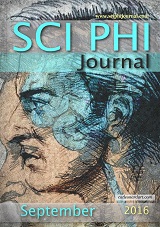 Sci Phi Journal #17, September 2016
Sci Phi Journal #17, September 2016
“Awake” by Becky Enoch
Reviewed by Benjamin Wheeler
“Awake” by Becky Enoch
In this short story, Emet is having problems sleeping and visits one Dr. Brice to discuss the problem. Dr. Brice recommends a pill. Emet takes the pill and wakes up in a body he doesn’t know, on a planet he doesn’t recognize. He is found by Dr. Brice who explains that certain bodies are empty until a wandering soul fills them from a star far away. This leads to a very fine stinger.
An interesting idea and gimmick the author provides to question the nature of consciousness and sleep. The stinger is quite good, but this isn’t the best story overall as a platform for what it implies. There are several questions from the stinger concerning responsibility, memory and what happens to Mr. Emet’s wife. While I did enjoy the story, it left me a little hungry for more depth.
“Times are Burning” by Adam Armstrong
Here, two humans meet with a being that serves as the inspiration for Cthulhu of Lovecraft fame. They discuss matters, including the end of the universe and entropy. They then promise to fight it after stating why they would.
This tale is very well written, probably has some of my favorite descriptions in the issue. It says nothing new. It is not much of a philosophical statement to say ‘We are damned, but the universe will continue.’ The protagonists promise to help fight entropy. They also use selfishness as enough of a motivation for their work. I found this work shallower than others in this issue. If you like it, I do recommend John C. Wright’s Golden Oecumenae series for the same ideas, but the books handle it better due to their longer length.
“Actus Reus” by Patrick McPhee
This thriller has one Mr. Charon on trial for murder; however, his crime is only that he has merely looked at people. The people then died seconds later, quite mysteriously. The court case drags on, as experts on the parapsychological are brought in. Linda Stinson is the prosecutor, and looks for any way to get Mr. Charon charged for his alleged crimes.
This is one of the stronger stories in this issue. The pacing is solid, with a great ending. The discussion of what counts as science is quite deep. It makes the simple statement that what counts as science was decided upon by authority, not by any actual proof. At the end, whether or not there is scientific evidence, the truth stares them in the face.
“Hello Hell” by Mark Butterworth
In “Hello Hell,” John dies and goes to Hell. He lived not a bad life and was merely sent to the first level of Hell. He explores it, and finds out that the only pleasure in hell is taste. He takes a job to pay for this one pleasure in this timeless eternity.
This story has a single question about what Hell is like. Then, it proceeds to answer its own questions in a way one might expect. It strikes me that it was written by someone who does not want to think too hard about the realities of true eternal damnation.
“Infinite Boyfriends” by Marie Vibbert
Trina and Nick break up their relationship and Trina runs to the comfort of her mad scientist friend Stacey. Stacey provides replacement Nicks from many other dimensions. This ends in many humorous failures.
It’s a good look into multiple dimension theory and the problems of dragging clones from them. There’s also the always interesting look into female nature and the general desire for Boyfriend 2.0. The story has its flaws but its strong points are the natural reactions to dimension hopping and the ending that defies our expectations.
“Javi and Parma” by Ellen Denton
This story concerns two pairs of a species of alien connected by a cord of flesh to one another. If separated, they die. Surgery can save them, but the two that this surgery preserves are forced to leave their planet. They then become Adam and Eve of Earth.
This story asks questions of science, but not well. The idea that the mob can be against science or change is presented fairly black and white. It’s a sort of strawman fallacy. This lack of detail and the lack of showing the normal culture, hurts the position the author may have. The author doesn’t seem to argue for other issues, but seems to think the overall problem is essentially transhumanism versus anti-transhumanism.
“FlipOuts” by Barry Rosenberg
Lastly, the world goes crazy and the population calls it a FlipOut. Leo is put on the case and realizes it’s connected to an electronic headband. By viewing certain Escher-esque illusions it can cause the brain to malfunction. In this way, he saves everyone from FlipOuts in the future.
This story is the good kind of classic SF where there’s a main character who solves a problem through investigation and chance. It’s got a clever idea, solid function and a great ending. I like the idea that electronic devices modify or harm the brain patterns, as well as the subtle statement that humans have souls.
Benjamin Wheeler is a philosophical crazy living in Saint Louis.